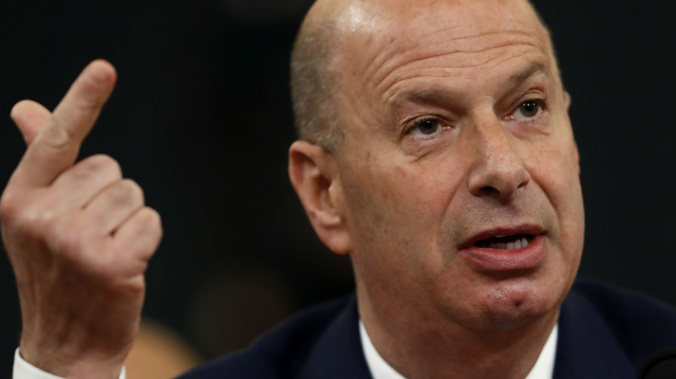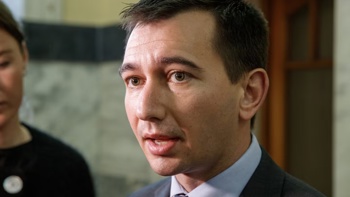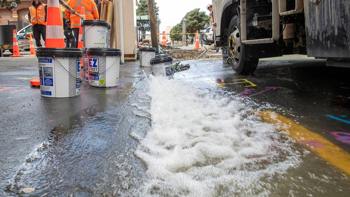
Gordon Sondland, President Donald Trump's ambassador to the European Union, bolstered Democrats' impeachment narrative Wednesday as he repeatedly talked of a "quid pro quo" involving Ukraine.
He said "everyone was in the loop" about President Donald Trump's push for Ukraine to announce investigations into a Ukraine gas company and the 2016 U.S. election.
Sondland was one of the most anticipated witnesses as Democrats are holding a rigorous week of hearings into whether Trump's dealings with Ukraine are grounds for impeachment.
Sondland told lawmakers that he worked with Rudy Giuliani on Ukraine at Trump's direction and that he eventually came to believe that military aid for the country was dependent on Ukraine launching the investigations.
Separately, in a second evening hearing, a Defense official provided new details about when Ukrainians learned that the aid was being held up — a key question in determining whether the aid and investigations were linked.
Takeaways from Day 4 of the impeachment inquiry before the House intelligence committee:
THIS FOR THAT
Sondland repeatedly referred to a quid pro quo — one thing in return for another — in describing the administration's dealings with Ukraine.
It was a remarkable spectacle: Trump's own ambassador using the exact term that the president himself has disavowed. Sondland is hardly a Never-Trumper: He donated $1 million to Trump's inaugural committee before being named ambassador.
"I know that members of this committee have frequently framed these complicated issues in the form of a simple question: Was there a `quid pro quo?' As I testified previously, with regard to the requested White House call and White House meeting, the answer is yes," Sondland said.
The quid pro quo in this case, he said, involved arranging a White House visit for Ukraine's new president, Volodymyr Zelenskiy, in return for Zelenskiy's announcing investigations of Burisma, a Ukrainian gas company, and a discredited conspiracy theory that Ukraine had interfered in the 2016 U.S. presidential election. Biden's son Hunter was a Burisma board member.
That proposed arrangement was pushed by Giuliani, Trump's personal lawyer, who conveyed Trump's wishes to multiple administration officials. Sondland said he did not know until September that what was actually desired was an investigation into the Bidens.
____
A PRESUMPTION
Notably, though, Sondland says no one ever told him that hundreds of millions of dollars in security assistance to Ukraine was similarly contingent on satisfying Trump's request for investigations.
He said he simply presumed that was the case, based in part on the absence of any credible explanation for the withholding of the aid.
The White House took note of that testimony and turned it in the president's favor in a statement issued during Sondland's testimony.
"Sondland is basing his new testimony on presumptions he had made regarding President Trump's wishes," the statement said. Under questioning from the committee chairman, Rep. Adam Schiff, D-Calif., "Sondland confirmed he presumed what the President wanted. Sondland said that he `speculated` about and `presumed` what the President wanted."
___
WHAT UKRAINE KNEW AND WHEN
The question of a possible connection between the aid and Trump's demand for investigations was central to the testimony of Defense Department official Laura Cooper during the evening session.
She told lawmakers that Ukrainian Embassy officials were asking about the military aid on July 25, earlier than previously known.
That could undercut a Republican argument that there couldn't have been a quid pro quo involving military aid because the Ukrainians didn't know that the aid was being held up
Cooper said she has seen emails provided by her staff since she was deposed last month that showed the embassy was asking questions. She said she has also recently been informed that a Ukrainian Embassy contact had asked a member of her staff that same day "what was going on" with the aid.
July 25 is when Trump's spoke on the phone with Zelenskiy and pushed for the Biden investigation. That call is at the heart of the impeachment probe.
Cooper told lawmakers she "cannot say for certain" that Ukraine knew the money was being withheld, but she said "it's the recollection of my staff that they likely knew."
____
'AT THE EXPRESS DIRECTION' OF TRUMP
Sondland says he was uncomfortable working with Giuliani, but he did so at the "express direction of the president of the United States."
"We did not want to work with Mr. Giuliani. Simply put, we played the hand we were dealt," Sondland said.
Democrats will certainly point to the diplomat's remarks to undercut any distance that Trump might try to put between him and demands that were placed on Zelenskiy.
Sondland said Giuliani emphasized to him in a subsequent conversation that Trump wanted a public statement from Zelenskiy committing Ukraine to look into corruption issues, including looking into potential interference in the 2016 election and Burisma.
"Mr. Giuliani's requests were a quid pro quo for arranging a White House visit for President Zelenskiy," Sondland said. "Mr. Giuliani was expressing the desires of the President of the United States, and we knew that these investigations were important to the President."
___
'EVERYONE WAS IN THE LOOP'
Sondland made clear that this was no rogue effort. He said he was open about Trump's demand that Ukraine commit to the investigations.
Sondland's account made clear his refusal to be a fall guy for the administration's dealings with Ukraine and underscored that officials across the government were aware of the unconventional dialogue.
He updated Secretary of State Mike Pompeo and the White House's acting chief of staff, Mick Mulvaney, telling them that Ukraine's leader would conduct a "fully transparent investigation" and "turn over every stone."
Sondland further told Pompeo that he and another diplomat, Kurt Volker, had negotiated a statement that Zelenskiy could deliver that "will hopefully make the boss happy enough to authorize an invitation" to the White House.
"Everyone was in the loop. It was no secret," Sondland said.
Sondland mentioned Vice President Mike Pence as well, telling him he was concerned that aid to Ukraine had become tied to the investigations.
Marc Short, Pence's chief of staff, said that Pence never spoke with Sondland "about investigating the Bidens, Burisma, or the conditional release of financial aid to Ukraine based upon potential investigations."
In Brussels, Pompeo dismissed Sondland's testimony, but didn't comment on specifics.
___
THE IMPACT
Sondland's testimony almost certainly advanced the case for impeaching Trump. It moved the effort to get Ukraine to announce an investigation of the Bidens closer to the president.
The testimony also may help House Democrats build a separate impeachment charge against Trump for getting in the way of their investigation, said former independent counsel Kenneth Starr, whose investigation led to President Bill Clinton's impeachment 20 years ago.
"That just got drawn up today thanks to Ambassador Sondland," Starr said on Fox News. Sondland said that the administration refused to give him access to records that might have helped him prepare his testimony.
In a normal criminal case, Trump's side would try to damage Sondland's credibility, exploit inconsistencies in his testimony and note that Sondland said the president never personally directed him to dangle a White House meeting in return for announcing the investigation. The effort could create a reasonable doubt that would prevent a jury from returning a conviction.
But impeachment takes place in a political arena, not a court of law. Impeachment scholars stress the standard of proof for impeachment is lower than it is in the courtroom. Though that would seem to work against Trump, the political nature of impeachment ultimately benefits him. Republicans have been united in defense of Trump and, even if he is impeached, it's difficult to see Republican-run Senate removing him from office.
___
TRUMP CLAIMS EXONERATION
Sondland directly tied Trump to the effort to push Ukraine to investigate the Bidens. But Trump is seizing upon a portion of that testimony to make his defense.
While Sondland was testifying, Trump briefly addressed reporters as he left the White House on his way to Texas. Trump normally speaks off-the-cuff, but on Wednesday he read from handwritten notes that appeared to be scrawled in the black Sharpie that the president favors.
Trump launched into a defense, selectively recounting Sondland's testimony that Trump told him there was no quid pro quo and that he wanted nothing from Ukraine.
"That means it's all over. This is the final word from the president of the United States. I want nothing," Trump said, before resorting to his usual description of someone from whom he wanted to distance himself. "I don't know him very well. I have not spoken to him much. This is not a man I know well. He seems like a nice guy though."
Trump also disputed what he said was Sondland's characterization that Trump was in a bad mood during their conversation.
"I'm always in a good mood. I don't know what that is."
____
CONFIRMING THE OVERHEARD CALL
Sondland confirmed a July 26 call with Trump that was revealed by another diplomat last week.
A U.S. diplomat in Ukraine, David Holmes, told impeachment investigators last week about the phone call between Trump and Sondland.
Holmes overheard the cellphone call, conducted a day after Trump pushed Zelenskiy to investigate Democrats, while Holmes was dining with Sondland at a Kiyv restaurant. Holmes said Sondland told Trump that Zelenskiy would conduct the investigations he was seeking and would do anything he wanted. He opened the call by telling Trump that Zelenskiy "loves your ass."
Sondland also said that he had "no reason to doubt that this conversation included the subject of investigations," but said the conversation didn't strike him as significant. For Democrats, though, it provides further direct evidence of Trump pressuring Ukraine to investigate the Bidens.
Sondland said the White House confirmed the call by sharing certain call dates with his attorneys.
Asked about the "loves your ass" comment, Sondland sheepishly acknowledged that he and Trump sometimes used colorful language during their conversations.
"That sounds like something I'd say," Sondland said. "That's how President Trump and I communicate, a lot of four-letter words. In this case, three-letter."
Take your Radio, Podcasts and Music with you









